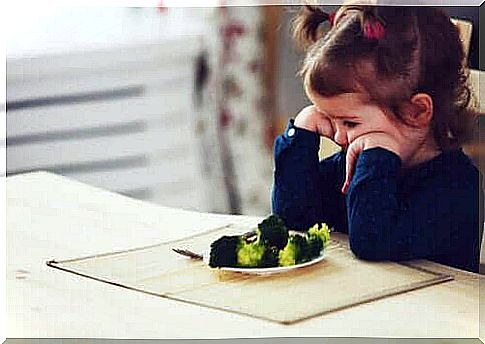What Is Neophobia Or Outright Pickiness?

It is called neophobia when a child is intimidated or refuses to eat new foods. This behavior is characteristic at certain times in the child’s development.
Sharing a meal with family and friends is great. In most cultures, it also represents the basis of most holidays and celebrations. It’s a great experience… unless one in the family suffers from neophobia. If this is the case, the meals can be long, tough and chaotic, because they require a lot of negotiation.
It can otherwise seem like something simple to eat a meal. We just have to put the food in our mouths, chew and swallow it. But it’s actually not that straightforward. Eating is an incredibly complex process that can be a real challenge for many people. It requires many systems to both collaborate and coordinate.
What is the cause of neophobia?
This pickiness about new foods is characteristic of all omnivorous species, including us humans. It is an innate reaction that should protect us from any dangers in the environment. In our natural environment, our food can also be toxic. Therefore, our reaction is often caution when faced with a new kind of food.
We avoid new foods if we can and eat the things we already know. Therefore, we only consider food to be safe after trying it a few times.

Another possible explanation may lie in the taste. People have four basic flavors: salty, bitter, sour and sweet. Sweet and salty tastes are innate in babies as the tastes they prefer as soon as they are born. Children are more searching for the sweet than the adults.
Learning to taste actually begins before we are born. Thus, there is a tendency for babies to prefer certain tastes that their pregnant mother ingests. In addition to the fetal stage, babies also experience taste through their breastfeeding.
Some flavors come with breast milk. Therefore, it can be said that the child gets to base his taste experiences already here.
What is characteristic of neophobia?
Food neophobia occurs mainly at two critical stages: detoxification (4 – 8 months) and independence (15 – 36 months). In the first stage, mother-child bonding helps prevent neophobia because the child feels protected. The most problematic stage comes when the baby reaches the age of 15 months.
One of the characteristics of neophobia is that the child experiences that new foods have an unpleasant taste. It is therefore crucial that you can give them a good experience when your child has to try new foods.
Leading by example seems to create good results. For example, if your child sees you eating a certain thing and you show signs of liking it, then your child is more likely to agree to try it.
Opposition to trying new foods shows up more often when it comes to:
- Food from animals rather than food that does not come from animals.
- Raw foods rather than cooked foods.
- Sour or bitter taste rather than sweet.
What is the best way to deal with it?
Studies show that the parents’ attitude to the child’s behavior has a significant influence on the development of the child’s preferences for food. It is therefore important to make sure that parents have a clear relationship with the foods that they offer their children.
It will promote the child’s desire to eat the same. For example, if you have a restrictive attitude towards what tastes good, the child’s interest in them will only increase. But a very liberal attitude towards certain foods seems to have a tendency to the opposite.

Pleasant moods where the child tastes new foods with their parents tend to create positive associations with the food they eat in these cases and vice versa. All of this proves how important it is for parents to be aware of this when they want to promote certain healthy foods in the child.
Neophobia usually disappears when the child is about 5-6 years old. But the children’s parents need to be patient with them so that they can cope with their neophobia and adopt healthier eating habits.









